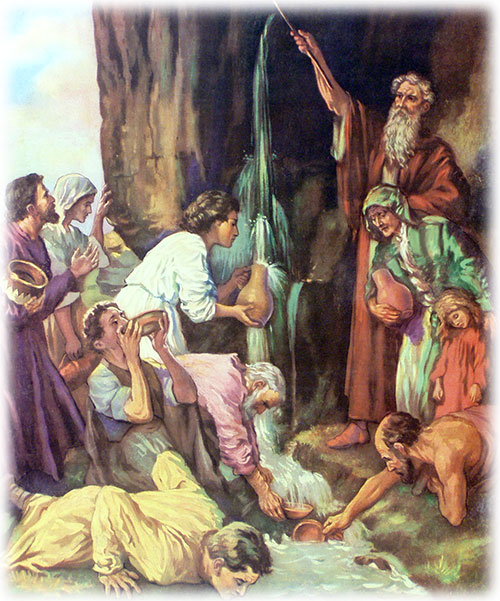

My Bible First - lessons 08
Based on Numbers 13, 14, 20, 21; Joshua 1-4, 6
Traveling to the Promised Land
MBF Lessons
My Memory Verse
And I, if I am lifted up from the earth, will draw all peoples to Myself. – John 12:32

“The cloud is going up! The cloud is going up!” Sure enough, the cloud over the tabernacle was majestically going up into the sky. Everyone knew what that meant. Numbers 9:17. They were going to start on their way to Canaan!
Now everyone was packing. The Levites and priests carefully packed each piece of the sacred furniture in the sanctuary. Everything was done smoothly and in perfect order.
Finally everyone was ready to start the trip to Canaan. The cloud moved ahead of them; the trumpets gave the signal; and the people started walking.
There was no super-highway to travel on. In fact, there was no real road. The way was rough and rocky. And the people soon saw that the cloud wasn’t leading them by the shortest way. And even though God took care of them, they complained about many different things.
Finally they camped at Kadesh, near Canaan, and everyone was excited. What did God tell Moses? Numbers 13:1, 2.
So the spies were chosen, and away they went to inspect the beautiful country that God had promised to give them. What would it be like? The spies were gone almost six weeks, while the people waited impatiently for them to return. Finally, they all got back. There certainly wasn’t any doubt about what kind of food grew in Canaan. The men brought back samples with them, and they were wonderful! One bunch of grapes was so large, it took two men to carry.
Everyone eagerly listened to the report of the spies. What did the men say first? Numbers 13:27. The people smiled happily. But then the smiles changed. As the men talked on, the people became more and more frightened. The men told about strong walls around the cities and what terrible enemies lived there. They said the giants were so huge that they felt about as big as grasshoppers compared to them.
Now the people became angry and started complaining again. They even talked about going back to Egypt. How sad! They hadn’t changed at all.
Two of the spies who had inspected Canaan didn’t agree with the way the others talked. They were Caleb and Joshua. When the people got angry, what did Caleb tell them? Numbers 13:30.
But the other ten spies insisted that the Canaanites were stronger than the Israelites, and that they could not drive them away. What cowards they were! They were leaders, but what a terrible example they were giving the people! Caleb and Joshua were the only brave spies, and they truly trusted God. Read what they said. Numbers 14:6-9.
Of course, God was strong enough. He can do anything. But there is one thing He has never done, and He never will do. He will never force people to trust Him.
Moses and Aaron prayed, and they asked God what to do. Was there no one except Moses and Aaron and the two brave spies who trusted God? Moses begged God to forgive the people once more. Did He? Numbers 14:20.
But God knew there was no way that the Israelites would be able to go into the promised land unless they chose to truly believe and trust His power. And they were still not choosing to do that.
What did God have to tell them through Moses? Numbers 14:29-35. All the people who were 20 years old and older when they were numbered at Sinai would die in the wilderness, except Caleb and Joshua. Those two faithful spies would go into Canaan, but that would not be until 38 more long years had passed. Deuteronomy 2:14.
During those many years of moving from place to place in the wilderness, the children who were less than 20 years old at Sinai grew up. And now at last, after nearly 40 years, it was almost time to go into the land that God had promised so long ago.
They had returned to Kadesh, which was close to Canaan; and from their camp, they could see the beautiful hills of the land that God wanted to give them. Would they be any different from their rebellious parents? Moses and Aaron would soon find out.

Ever since that time when the Israelites ran out of water, and Moses struck the rock at Horeb, they had always had all the water they needed, even though they lived in the desert.
Maybe they expected it to always be that way. Maybe they forgot that it was always a miracle, and maybe they were forgetting to thank God for always taking care of them.
But now they were camped at Kadesh, and there was no water for them. Did they think to pray to God about it? No. What did they do? Numbers 20:1-5.
Does what they did sound like something we have heard before? Would their complaining this time mean that, like their parents, they would have another long wait in the wilderness, and finally die there? When Moses and Aaron talked to God about it, what did He tell them to do? Numbers 20:6-8.
What was the difference between what Moses was to do this time and what he did the first time that water came from the rock? Did Moses do exactly what God said to do this time? Numbers 20:9-12. Moses was both impatient and angry, and he disobeyed God. When he struck the rock twice, it spoiled the beautiful meaning of the rock. Just as everything in the sanctuary told about Jesus, so did the rock. When Moses struck the rock the first time, many years before, water came gushing out.
This represented Jesus, who would be “struck” only once. In other words, He would die only once. And because He would die for us, we could have all the forgiveness and help each of us would ever need in order to be free from Satan. He wouldn’t need to die again.
All we ever have to do is ask Him—“speak” to Him—to give us His water of life. We drink from Him when we study the Bible and learn about Him. Read what Paul said about Jesus in 1 Corinthians 10:4.
Because Moses was a leader, did God excuse his disobedience? When a leader disobeys, it is always very serious, because then people can think that obeying must not be very important.
Did Moses make excuses? Not at all. He told everyone that he had sinned, and that he would not be allowed to lead them into Canaan. God had not excused him just because he was a leader. No sin is “little.” Moses was terribly disappointed. But the people knew now that God is fair.
As God led the Israelites toward Canaan, the grumbling soon started again. God knew that they had forgotten how much He was helping them. Besides always giving them food and water, He had protected them and their animals from very poisonous snakes. They were called fiery serpents, and they lived in the wilderness where the Israelites were traveling.
grumbling soon started again. God knew that they had forgotten how much He was helping them. Besides always giving them food and water, He had protected them and their animals from very poisonous snakes. They were called fiery serpents, and they lived in the wilderness where the Israelites were traveling.
Now, to help them realize their blessings, God stopped protecting them from the snakes. And soon people were dying from poisonous snakebites. What they had grumbled about before seemed not so important now. Everyone was terrified because of the snakes. The people rushed to Moses and asked him to pray for them. What did God tell Moses to do? Numbers 21:7-9.
What a strange cure! How could a lifeless, bronze serpent suddenly cure someone who was dying? In fact, some thought it didn’t make any sense at all; they wouldn’t look at the serpent. And they died.
But whoever believed what God had said, obeyed Him by looking at the serpent; and they were healed.
Did the bronze serpent cure people? Of course not. But by looking at it, people showed that they were trusting God to heal them and that they could not save themselves. The bronze serpent represented Jesus, our Savior. John 3:14-16. Just like the daily sacrifices, the bronze serpent was to help the Israelites remember that they could not save themselves.
But by looking at it, people showed that they were trusting God to heal them and that they could not save themselves. The bronze serpent represented Jesus, our Savior. John 3:14-16. Just like the daily sacrifices, the bronze serpent was to help the Israelites remember that they could not save themselves.
They had to trust Jesus to save them from Satan. And just as those Israelites were bitten by poisonous serpents, so each person that has ever lived has sinned. We have all been “bitten” by Satan, who is called a serpent. Revelation 12:9; 20:2. And we will all die, unless we look to Jesus.
Looking at the serpent that Moses raised upon a pole for the Israelites was like looking at what Jesus was going to do for them when He would be raised up on the cross. The Israelites were saved only by trusting in Jesus. And we are saved only by trusting in Jesus, too. Only because of Jesus can we be sorry for our sins and have them forgiven. And only because of Jesus can we have clean hearts that want to obey Him.

The Israelites were happy that they would soon be crossing the Jordan River and going into the beautiful land that God had promised to give them. But Moses would not be going with them. After he reminded them again to trust and obey God, he went to the top of a mountain and died. Deuteronomy 32:48-50.
Now Joshua was their leader. Although he was brave and wise, and had loyally worked with Moses for many years, he was fearful of leading without him. God knew how he was feeling, so what did He say to encourage him? Joshua 1:5-9.
After crossing the Jordan River, Jericho would be the first city they were to take; and it had high, strong walls. But Joshua believed God’s promises to go with them and give them victory, so he was full of courage.
Joshua sent two spies to see how big and strong Jericho was, and what the people were like. They stayed at Rahab’s house in the city, but somehow the king found out; and he sent men to her house to capture them. Joshua 2:3.
What did Rahab say to the king’s men? Where were the two spies hiding? What did the king’s men do next? Joshua 2:4-7.
Rahab didn’t know about God’s Ten Commandments, and that one of them says not to lie. She knew hardly anything about the true God, except that He was very powerful. In fact, all the people of Jericho knew about God’s power. And Rahab told the two spies how terrified they were of the Israelites. Joshua 2:11.
Rahab was so sure that God would help Israel conquer Jericho, she asked the spies to protect her and her family when they would take the city. They promised that they would. And since her house was on the city wall, she let them down by a rope to the outside of the city, and they escaped. Joshua 2:12-16. 
The two spies hurried away from Jericho to hide in the hills. When they later returned to Joshua, what report did they give him? Joshua 2:24.
Now it was time to move into Canaan, and in three days, everyone was ready. It was springtime; and the Jordan River was wide, because the water had overflowed its banks. Would God part the river water, like He had parted the water of the Red Sea?
The priests carrying the ark moved toward the river and stepped right into the water. And at that moment, a miracle happened. The water flowing from upstream stopped and piled up into a huge heap far up the river. The water downstream flowed on, leaving the riverbed bare and dry. Joshua 3:14-17.
The priests stood in the riverbed with the ark until everyone was safely on the other side of the Jordan River. Then what happened? Joshua 4:15-18.
When the people living in Jericho and other cities heard about the Israelites crossing the Jordan River, they were terrified. And the strange way God told Joshua to conquer Jericho would give them more reason to be afraid. Joshua 6:1-4.
Can you imagine how the people inside Jericho felt as they watched for six days while the Israelite army and the priests carrying the ark marched around their city? Besides the sound of marching feet, the only other sound they made was the blowing of the horns from time to time. It was all very frightening. Joshua 6:8-10.
Then came day seven. Maybe the people in the city started counting when the Israelite army started marching around more than one time. At the end of the seventh round, suddenly, at the signal from Joshua, there was a great shout. Instantly, all the city walls came crashing down, except the part of where Rahab lived. The two spies rescued Rahab and her family, and then the city was burned.
Remembering What My Bible Says . . .
- So many times our loving God had shown the Israelites that there was nothing impossible for Him to do if they would only trust Him! Can we trust God, even if we don’t understand how He can keep His promises?
- Our words can make a big difference, can’t they? They can make people want to complain, or they can help people trust God. What can you say that will help your friends and family trust God?
- Is it easy for you to be impatient and get upset when you can’t have what you want right away? What should you do instead?
- Sometimes we forget that our blessings come from God. We should always be thankful for the many blessings that God gives us. Psalm 136:1-3. Did the bronze serpent cure the Israelites? What did it represent? John 3:14-16.
- Rahab chose to trust God instead of idols. Hebrews 11:31. Are you glad that God knows each person so well? And God was happy that Rahab trusted Him. He will save anyone who trusts in Him. John 6:37.
- We don’t have enemies living in cities with high, strong walls today. But we do have other kinds of enemies. How about being afraid of being different from other children, or being afraid to tell the truth sometimes? Jesus can help us to be strong and of good courage, and not be afraid to choose to do right when we are tempted to do wrong. Ephesians 6:10-18.
My Committment
The Israelites could never have crossed the Jordan River or knocked down the walls of Jericho by themselves. But when they trusted God, He helped them. Do you want to trust God to help you, even in the hard times?
My Bible First - Lesson 08 - "Traveling to the Promised Land"
© My Bible First Bible lessons & Logos are used by permission.

